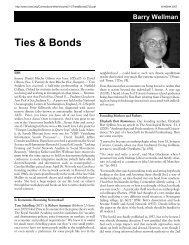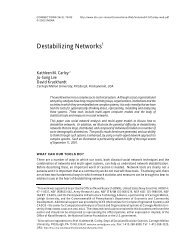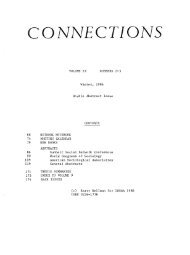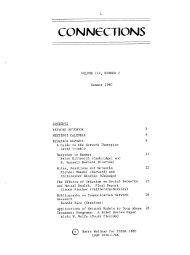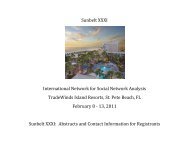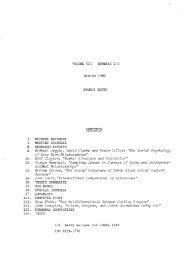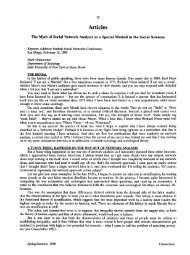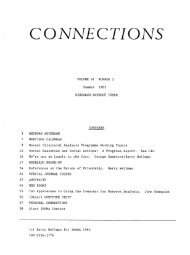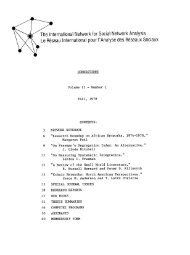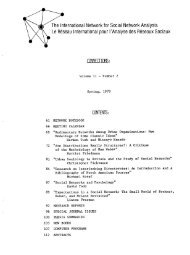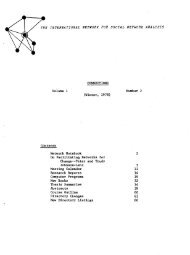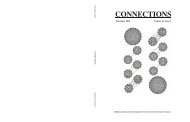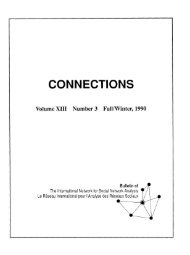Text Analysis of the Social Capital Literature Network ... - INSNA
Text Analysis of the Social Capital Literature Network ... - INSNA
Text Analysis of the Social Capital Literature Network ... - INSNA
You also want an ePaper? Increase the reach of your titles
YUMPU automatically turns print PDFs into web optimized ePapers that Google loves.
30<br />
Building a Theory <strong>of</strong> <strong>Social</strong> <strong>Capital</strong> / Lin<br />
<strong>of</strong> <strong>the</strong>se <strong>the</strong>ories resides in <strong>the</strong> potential investment and capture <strong>of</strong> surplus value by <strong>the</strong> laborers<br />
or masses . <strong>Social</strong> capital, I argue, is ano<strong>the</strong>r form <strong>of</strong> <strong>the</strong> neo-capital <strong>the</strong>ories .'<br />
Table 1 . Theories <strong>of</strong> <strong>Capital</strong><br />
Theorist<br />
Marx<br />
I Explanation <strong>Social</strong> relations :<br />
,Exploitation by <strong>the</strong><br />
capitalists (bourgeoise)<br />
<strong>of</strong> <strong>the</strong> proletariat<br />
<strong>Capital</strong><br />
i Level <strong>of</strong><br />
I <strong>Analysis</strong><br />
The<br />
The Neo-<strong>Capital</strong> Theories<br />
Classical Human Cultural I <strong>Social</strong><br />
Theory j <strong>Capital</strong> <strong>Capital</strong> <strong>Capital</strong><br />
A . Part <strong>of</strong> surplus value<br />
between <strong>the</strong> use value (in<br />
consumption market) and<br />
<strong>the</strong> exchange value (in<br />
production-labor market)<br />
<strong>of</strong> <strong>the</strong> commodity .<br />
B . Investment in <strong>the</strong> production<br />
and circulation<br />
<strong>of</strong> commodities<br />
Structural (classes)<br />
Schultz, Becker<br />
', I Accumulation Reproduction <strong>of</strong> Access to and<br />
<strong>of</strong> surplus value i dominant symbols use <strong>of</strong> resources<br />
by laborer and meanings embedded in<br />
(values)<br />
social networks<br />
Investment in<br />
technical skills<br />
and knowledge<br />
Individual<br />
Bourdieu Lin, Burt, Bourdieu,<br />
Marsden, Flap, Coleman,<br />
Coleman Putnam<br />
Internalization or Investment in<br />
misrecognition <strong>of</strong> social networks<br />
dominant values<br />
Individual/class<br />
Individual<br />
Solidarity and<br />
reproduction <strong>of</strong><br />
group<br />
Investment<br />
j in mutual<br />
recognition and<br />
acknowledgment',<br />
I<br />
Group/<br />
individual<br />
WHY DOES SOCIAL CAPITAL WORK<br />
The premise behind <strong>the</strong> notion <strong>of</strong> social capital is ra<strong>the</strong>r simple and straightforward : investment<br />
in social relations with expected returns . This general definition is consistent with various<br />
2 There is some ambiguity in Bourdieu 's writings as to whe<strong>the</strong>r cultural capital should be seen as a structural<br />
<strong>the</strong>ory or a <strong>the</strong>ory which allows choice actions . He (Bourdieu, 1990 ; Bourdieu & Passeron, 1977) defines culture as<br />
a system <strong>of</strong> symbolism and meaning (Jenkins 1992, p . 104) . The dominant class in <strong>the</strong> society imposes its culture<br />
by engaging in pedagogic action (e .g ., education), which internalizes <strong>the</strong> dominant symbols and meanings in <strong>the</strong> next<br />
generation, thus reproducing <strong>the</strong> salience <strong>of</strong> <strong>the</strong> dominant culture . The result is an internalized and durable training,<br />
habitus, in <strong>the</strong> reproduction <strong>of</strong> <strong>the</strong> culture. The mass is not cognitively aware <strong>of</strong> <strong>the</strong> imposition and takes on <strong>the</strong><br />
imposed culture as <strong>the</strong>ir own - misrecognition. This rendition <strong>of</strong> capital can trace its lineage to Marx . The social<br />
relations described by Marx are also assumed ; <strong>the</strong>re is a class, capitalists, who control <strong>the</strong> means <strong>of</strong> production - <strong>the</strong><br />
process <strong>of</strong> pedagogic action or <strong>the</strong> educational institutions (in <strong>the</strong> homes, in schools, etc .). In <strong>the</strong> production<br />
(schooling) process, laborers (students or children) invest in <strong>the</strong> educational process and internalize <strong>the</strong> dominant class<br />
culture. Acquisition <strong>of</strong> this culture permits or licenses <strong>the</strong> laborers to enter <strong>the</strong> labor market, earn payments and<br />
sustain expenditures for <strong>the</strong>ir lives . The capitalists, or <strong>the</strong> dominant class, gain cultural capital which supplement <strong>the</strong>ir<br />
economic capital and accumulate capital <strong>of</strong> both types in <strong>the</strong> circulation <strong>of</strong> <strong>the</strong> commodities (educated mass) and <strong>the</strong><br />
domination <strong>of</strong> <strong>the</strong> means <strong>of</strong> production (<strong>the</strong> educational institutions) . However, <strong>the</strong>re is a break from Marx and an<br />
important one . Bourdieu does not assume perfect correspondence between <strong>the</strong> accumulation <strong>of</strong> economic capital and<br />
cultural capital . Some economic capitalists do not possess cultural capital and some cultural capitalists are not<br />
economically endowed . This less than perfect correspondence would seem to open <strong>the</strong> possible path for some <strong>of</strong> <strong>the</strong><br />
laborers, using <strong>the</strong>ir cultural habitus, to gain a foothold in <strong>the</strong> dominant class . It is conceivable that <strong>the</strong>y become part<br />
<strong>of</strong> <strong>the</strong> educational institutions and gain returns in <strong>the</strong> labor market, due to <strong>the</strong>ir cultural capital . Bourdieu did not carry<br />
his analysis this far, but seems to leave open <strong>the</strong> process <strong>of</strong> social mobility and <strong>the</strong> possibility <strong>of</strong> agency .



